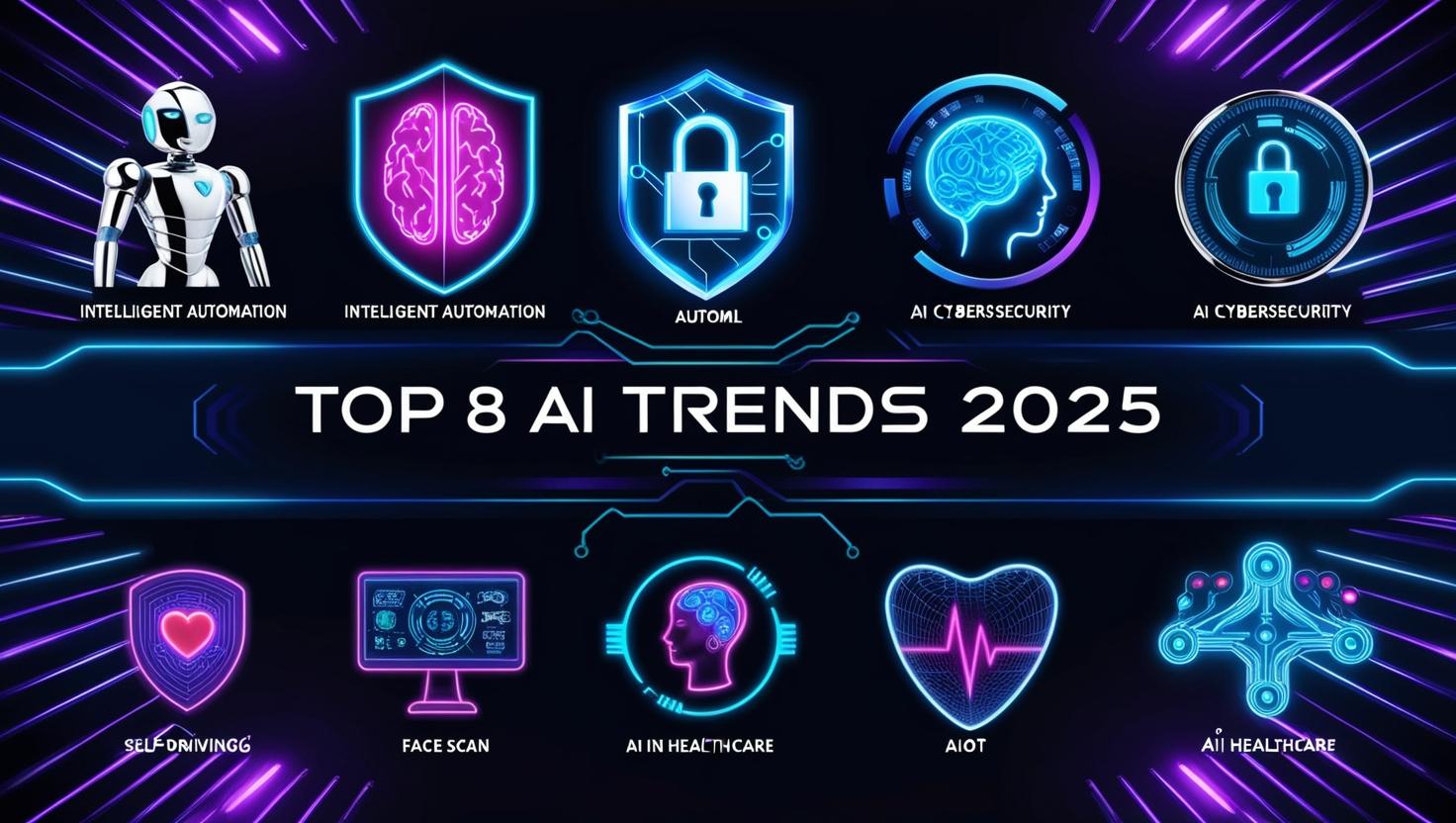Top 8 AI Trends 2025: Intelligent Automation, Cybersecurity, AutoML & More | Vraiverse
- Agumented Reality, AI, Cloud Computing, Data Science, Digital Marketing, Hacking
- April 19, 2025
Ai Trends 2025: Artificial Intelligence (AI) is not just evolving — it’s revolutionizing how we work, live, and connect with technology. From advanced automation to cutting-edge healthcare diagnostics, the AI wave is reshaping every industry. If you’re exploring a future in tech or want to upgrade your business with AI, this guide reveals the top AI trends of 2025 that are worth watching.
Let’s dive in.
1. Intelligent Process Automation (IPA): The Smart Evolution of RPA
Intelligent Process Automation (IPA) is transforming how businesses operate by merging Robotic Process Automation (RPA) with AI technologies like machine learning, natural language processing, and computer vision. Unlike basic automation, IPA can process unstructured data (like PDFs, emails, or images), interpret intent, and even self-learn to improve over time.
This results in higher productivity, reduced operational costs, and near-zero errors — making IPA one of the most adopted enterprise AI applications today.
For instance: Financial firms like JPMorgan Chase and healthcare providers are using IPA to automate compliance reports, claims processing, and patient data management — all with minimal human intervention.
2. AI-Powered Cybersecurity: Real-Time Detection, Real-Time Defense
Cybersecurity is no longer optional — it’s a survival necessity. As cyberattacks become more sophisticated, AI-driven security systems are being deployed to detect, analyze, and respond to threats in real-time.
These systems use anomaly detection, pattern recognition, and predictive analytics to stop cyber threats before they strike. AI in cybersecurity also handles large volumes of data from multiple sources without compromising speed or accuracy.
Companies like CrowdStrike, Darktrace, and Symantec use AI-based threat modeling to protect banks, governments, and Fortune 500 companies from ransomware, phishing, and insider threats.
3. Hyper-Personalisation with AI: Experiences Tailored Down to the Pixel
In 2025, customers expect more than good service — they expect personalized experiences. AI enables real-time user data analysis to deliver hyper-personalised recommendations, messages, and product offerings.
From personalized emails and ads to content feeds tailored to a user’s interests, businesses are using AI to build deeper, more valuable customer relationships.
Netflix’s AI engine suggests shows based on minute behavior patterns, while Amazon and Shopify use AI to recommend products tailored to your browsing and purchase history, boosting conversion rates significantly.
4. Automated AI Development (AutoML): Build AI Without Writing Code
The rise of AutoML (Automated Machine Learning) is removing the barriers that once made AI accessible only to data scientists. AutoML allows users to build, train, and deploy models through intuitive interfaces — no coding required.
This trend is especially powerful for small businesses, students, and non-tech professionals who want to harness AI for real-world problems like sales forecasting, image classification, or customer segmentation.
Tools like Google Cloud AutoML, H2O.ai, and Microsoft Azure ML Studio are now used by startups and enterprises to reduce time-to-market for AI-based products by up to 60%.
5. AI in Autonomous Vehicles: Driving Into the Future (Literally)
AI is the brain behind self-driving cars. It processes data from sensors, cameras, GPS, and radar to make split-second driving decisions. But in 2025, AI goes beyond just navigating roads — it’s used in fleet optimization, predictive maintenance, insurance risk analysis, and even autonomous delivery systems.
Urban traffic systems are also integrating AI to manage traffic lights, reduce congestion, and prioritize emergency vehicles automatically.
Tesla’s Full Self-Driving (FSD) beta uses deep learning for navigation. Meanwhile, companies like Cruise (by GM) and Waymo (by Alphabet) are piloting robotaxi services in US cities.
6. AI-Powered Facial Recognition: Smarter, Safer, and More Regulated
Facial recognition has made leaps in accuracy and ethical design. AI-driven systems are now capable of detecting emotions, age, gender, and even fatigue levels with high precision — all while maintaining GDPR and data privacy compliance.
While controversial, these systems are crucial for border control, surveillance, airport security, and even smart retail analytics to understand customer flow and satisfaction levels.
Airports in Dubai and Singapore use AI facial recognition for seamless immigration. Apple’s Face ID uses neural engines for fast, secure authentication.
7. AIoT: The Powerful Fusion of Artificial Intelligence and IoT
AIoT (Artificial Intelligence + Internet of Things) brings intelligence to devices — allowing them to analyze data and act without human input. In 2025, AIoT is used in smart homes, smart cities, industrial automation, precision agriculture, and wearable tech.
By processing data at the edge (closer to the source), these systems enable real-time decision-making — from optimizing energy usage to predicting equipment failures.
Smart factories run by Siemens and Bosch use AIoT for predictive maintenance. In agriculture, AIoT helps farmers optimize irrigation based on real-time soil and weather data.
8. AI in Healthcare: Predict, Diagnose, and Treat with Precision
In 2025, AI is transforming healthcare from reactive to proactive. AI algorithms can now detect diseases like cancer, Alzheimer’s, and diabetic retinopathy early and accurately. AI chatbots are offering 24/7 mental health support, and robot-assisted surgeries are delivering better outcomes with less downtime.
Even in drug discovery, AI shortens the R&D cycle by predicting compound interactions and optimizing formulations faster than ever before.
Tempus, PathAI, and Butterfly Network are leveraging AI for oncology diagnostics, telemedicine, and point-of-care ultrasound imaging.
AI in 2025 is not just a technology — it’s a strategic necessity. From businesses streamlining operations to students preparing for futuristic careers, the trends above prove that Artificial Intelligence is the engine of the digital economy.
If you’re ready to explore AI hands-on, Vraiverse offers a unique blend of tech experiences and job-ready learning. From AI and Machine Learning to VR, drone tech, and 3D innovation, Vraiverse courses are built with the future in mind.
Get certified, get skilled, and get future-ready with Vraiverse.com — your launchpad into tomorrow’s tech careers.


















